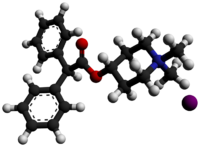Chemistry:4-DAMP
From HandWiki

| |

| |
| Names | |
|---|---|
| Preferred IUPAC name
4-[(Diphenylacetyl)oxy]-1,1-dimethylpiperidin-1-ium iodide | |
| Other names
4-(2,2-Diphenylacetoxy)-1,1-dimethylpiperidin-1-ium iodide
| |
| Identifiers | |
3D model (JSmol)
|
|
| ChemSpider | |
PubChem CID
|
|
| UNII | |
| |
| |
| Properties | |
| C21H26INO2 | |
| Molar mass | 451.348 g·mol−1 |
| Appearance | White to beige powder[1] |
Except where otherwise noted, data are given for materials in their standard state (at 25 °C [77 °F], 100 kPa). | |
| Infobox references | |
Tracking categories (test):
4-DAMP (1,1-dimethyl-4-diphenylacetoxypiperidinium iodide) is a selective muscarinic acetylcholine receptor (mAChR) M3 antagonist.[2] It is also able to antagonize M1 receptors but "prefers" M3.[3][4] It competitively binds to the acetylcholine binding site on mAChRs, causing right-ward shift in the dose response curves for mAChR agonists.
References
- ↑ "4-DAMP". Sigma-Aldrich. http://www.sigmaaldrich.com/catalog/product/sigma/sml0255?lang=en.
- ↑ Zhu, MH; Sung, IK; Zheng, H; Sung, TS; Britton, FC; O'Driscoll, K; Koh, SD; Sanders, KM (2011). "Muscarinic activation of Ca2+-activated Cl- current in interstitial cells of Cajal". J Physiol 589 (Pt18): 4565–4582. doi:10.1113/jphysiol.2011.211094. PMID 21768263.
- ↑ Teixeira-Neto, FJ; McDonell, WN; Black, WD; Harris, W and; Grovum, L (2012). "Effects of muscarinic receptor antagonists on acetylcholine-induced contractions of jejunal smooth muscle in horses". Journal of Veterinary Pharmacology and Therapeutics 35 (4): 313–318. doi:10.1111/j.1365-2885.2011.01330.x. PMID 21859432.
- ↑ Greenwood, JM and; Dragunow, M (2010). "M3 muscarinic receptors promote cell survival through activation of the extracellular regulated kinase (ERK1/2) pathway". Eur J Pharmacol 640 (1–3): 38–45. doi:10.1016/j.ejphar.2010.05.013. PMID 20519144.
 |
